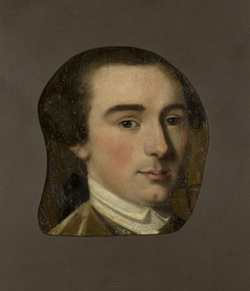Calvin Piper in Sickness, War, and Peace
Dr. James Hawes gave the boy a poor prognosis. The Rev. Ebenezer Parkman came to pray with him.
After a few days, Hawes gathered some medical colleagues to consult and perhaps perform surgery to relieve pressure in Calvin’s skull.
But on that morning of 6 August, Calvin woke up feeling much better than before. He was no longer delirious or babbling. The surgeons reconsidered.
The Rev. Mr. Parkman wrote in his diary:
It was feared the Trepan must be used: but it was first determined to take off part of his scalp and examine his Head. We began with prayer. Dr. [Charles] Russel [shown here] performed the Operation, and finding the grumous Blood, and that there was no Fracture, desisted from any thing further.So Calvin was sewn up and allowed to keep recovering on his own. Parkman visited him again a couple of days later, and then Calvin drops out of the minister’s diary, presumably going back to normal farm boy behavior.
Nearly two years later, as the British military was preparing to leave Boston, Parkman had to visit the Piper family again. On Sunday, 10 Mar 1776, he wrote:
At Even went to see Mrs. Piper, newly brought to bed, and is very low; prayed with her in her Distresses.The next day, Parkman added, “She is in a dangerous state.” And on Tuesday:
Capt. Wheelock early, Suddenly, hastily calls me to Visit Mrs. Piper as being near her End. I rode speedily (before Breakfast — nay before Family Prayer), found her groaning as in very great Distress. Prayed with her, Commending her Case to God, most gracious and compassionate. . . .The funeral was on Thursday, 14 March. The minister noted, “her Father Whitcomb and one of her Brothers were there.”
Mrs. Piper dyed about noon, about 42 and an half.
The Parkman diary thus contains some clues to the Piper family history. The mention of “Father Whitcomb” might indicate Mary Piper’s surname at birth. There were Mary Whitcombs born in Bolton and its parent town, Lancaster, in the 1730s. However, none was born in 1733 and thus “about 42 and an half” in 1776. It’s also possible that “Father Whitcomb” was a stepfather.
In addition, Parkman’s record confirms that this Mary Piper died in 1776. John Piper remarried the next year to a woman from Templeton named Mary White. That means there were two wives named Mary Piper having John’s children in quick succession, and some genealogies don’t recognize they were separate women.
Back to Calvin Piper: As he reached his late teens, he had a new stepmother. Did that push him to leave the house? Or did he want some adventure, or just need money? Whatever the combination of reasons, on 1 July 1780 Calvin enlisted among the “men raised to reinforce the Continental Army for the term of 6 months.” When he reported to the camp at Springfield, Calvin was recorded as seventeen years old, 5'4" tall, with a ruddy complexion.
Pvt. Piper served a little more than five months at West Point, New York, before being discharged. He liked the experience enough to reenlist the following June. By now he was an inch taller and had been trained as a tanner, perhaps in a family shop. This time there was a dispute about whether he was counted in the quota for Lancaster or Templeton—not that it mattered to him. Piper agreed to serve three years, but the war ended before that term was up.
The twenty-year-old veteran moved to Norridgewock in the district of Maine. In April 1785 he married Zeriah Parker there. Five years later, however, Mrs. Zeriah Piper remarried, indicating that Calvin Piper had died in his late twenties—about fifteen years after he escaped having a hole drilled in his skull.




